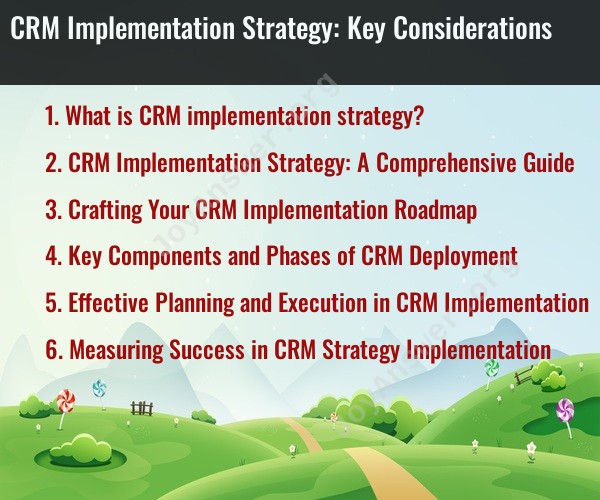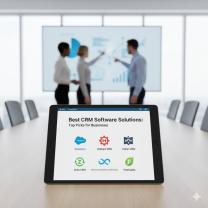What is CRM implementation strategy?
Customer Relationship Management (CRM) implementation strategy refers to the plan and approach a business or organization develops to successfully adopt and integrate a CRM system into its operations. CRM systems are designed to help companies manage and improve their interactions with customers and prospects, and a well-thought-out implementation strategy is crucial for maximizing the benefits of CRM. Here are some key considerations for a CRM implementation strategy:
Define Objectives and Goals:
- Clearly outline what you want to achieve with the CRM system. Are you looking to increase sales, improve customer service, enhance marketing efforts, or all of the above? Establish specific, measurable, and realistic goals.
Needs Assessment:
- Identify the specific needs of your organization. Assess existing processes and workflows to determine where CRM can add the most value. Understand the pain points and bottlenecks that CRM can help alleviate.
Select the Right CRM Software:
- Choose a CRM platform that aligns with your business requirements. Consider factors like scalability, integration capabilities, user-friendliness, and cost. Cloud-based CRM solutions are often a popular choice due to their flexibility.
Customization:
- Tailor the CRM system to match your business processes and industry. Configure it to collect and manage data that is most relevant to your organization. Ensure that it is user-friendly and aligns with your workflows.
Data Migration:
- Plan for the migration of existing customer data into the CRM system. Ensure data accuracy and consistency during the transition.
User Training:
- Provide comprehensive training to your employees on how to use the CRM effectively. They should understand its features and capabilities. User buy-in is crucial for successful implementation.
Change Management:
- Develop a change management plan to address resistance and ensure smooth adoption. Communicate the benefits of CRM to your staff and encourage them to embrace the new system.
Pilot Testing:
- Conduct a pilot test with a small group of users to identify any issues or areas for improvement before a full-scale rollout.
Integration with Existing Systems:
- Ensure seamless integration with other relevant systems, such as marketing automation tools, email platforms, and customer support software, to create a unified view of customer interactions.
Data Security and Privacy:
- Implement robust security measures to protect customer data and comply with data protection regulations. Ensure that sensitive information is kept secure.
Measurement and KPIs:
- Define key performance indicators (KPIs) to measure the impact of CRM on your business. Regularly assess and analyze data to track progress toward your objectives.
Support and Maintenance:
- Plan for ongoing support and maintenance of the CRM system. This includes troubleshooting, updates, and addressing user inquiries or issues.
Feedback and Continuous Improvement:
- Encourage feedback from users and stakeholders to make necessary adjustments and improvements to the CRM system over time.
Scalability:
- Ensure that your CRM system can grow with your business. Consider future expansion and how the CRM will support it.
Budgeting:
- Develop a budget that covers the initial implementation costs, as well as ongoing expenses like software licensing, support, and maintenance.
A well-considered CRM implementation strategy, when aligned with your organization's specific needs and goals, can greatly enhance your ability to manage and improve customer relationships, streamline processes, and drive business growth. It's important to involve key stakeholders, including end-users, in the planning process to ensure a successful CRM implementation.
CRM Implementation Strategy: A Comprehensive Guide
A CRM implementation strategy is a plan for how a business will deploy and use a CRM system. It should be tailored to the specific needs of the business and its customers. A well-defined CRM implementation strategy can help businesses to achieve their goals of improving customer relationships, increasing sales, and boosting profits.
Crafting Your CRM Implementation Roadmap
The first step in developing a CRM implementation strategy is to create a roadmap. This roadmap should outline the key steps involved in the implementation process, as well as the timelines and resources required for each step.
Here are some of the key steps that should be included in your CRM implementation roadmap:
- Assess your needs: Before you can choose a CRM system, you need to understand your specific needs and requirements. This includes identifying your business goals, the types of customer interactions you need to track, and the features that are important to you.
- Select a CRM system: Once you know what you need, you can start shopping for a CRM system. There are many different CRM systems available, so it is important to compare features and pricing before you make a decision.
- Data migration: One of the most important steps in CRM implementation is data migration. This is the process of transferring your existing data from your current system to your new CRM system. It is important to carefully plan and execute your data migration to avoid errors and data loss.
- System configuration: Once your data has been migrated, you need to configure your CRM system to meet your specific needs. This includes setting up user roles and permissions, creating custom fields, and configuring workflows.
- User training: It is important to train your employees on how to use the new CRM system. This will help them to get the most out of the system and use it to improve their productivity and customer service.
- Go-live and support: Once your CRM system is configured and your employees are trained, you are ready to go-live. This means that you will start using the new CRM system to manage your customer relationships. It is important to have a support plan in place for your CRM go-live and to provide ongoing support to your employees.
Key Components and Phases of CRM Deployment
CRM deployment can be divided into three main phases: planning, implementation, and post-implementation.
Planning phase: The planning phase is where you will define your CRM goals, select a CRM system, and create a roadmap for implementation.
Implementation phase: The implementation phase is where you will migrate your data, configure your CRM system, and train your employees.
Post-implementation phase: The post-implementation phase is where you will monitor the performance of your CRM system and make adjustments as needed.
Effective Planning and Execution in CRM Implementation
Effective planning and execution are essential for successful CRM implementation. Here are some tips for effective planning and execution:
- Involve key stakeholders: CRM implementation should be a collaborative effort. Involve key stakeholders from all departments of your business in the planning and execution process.
- Set realistic expectations: CRM implementation is a complex process that takes time and effort. Set realistic expectations for your CRM implementation and communicate them to all stakeholders.
- Track your progress: Track your progress throughout the CRM implementation process. This will help you to identify any potential problems early on and make necessary adjustments.
- Be flexible: Things don't always go according to plan. Be prepared to make adjustments to your CRM implementation roadmap as needed.
Measuring Success in CRM Strategy Implementation
There are a number of ways to measure the success of your CRM strategy implementation. Some common metrics include:
- Sales growth: CRM systems can help businesses to increase sales by improving lead management, customer service, and cross-selling and up-selling opportunities.
- Customer satisfaction: CRM systems can help businesses to improve customer satisfaction by providing a better customer experience.
- Productivity: CRM systems can help businesses to improve employee productivity by automating tasks and providing employees with easy access to customer data.
- Reduced costs: CRM systems can help businesses to reduce costs by automating tasks and improving efficiency.
By tracking these metrics over time, you can measure the impact of your CRM strategy implementation on your business.
Conclusion
CRM implementation can be a complex process, but it is a worthwhile investment for businesses of all sizes. By following the tips above, you can develop and implement a CRM strategy that will help you to achieve your business goals.













